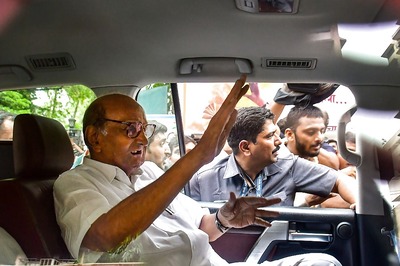
views
Cryptocurrency in India has seen a clear boost in recent times, with increasing interest among consumers to join the bandwagon. However, the rise of cryptocurrencies in India have had multiple twists and turns. After Bitcoin and Ethereum ruling the crypto conversation in India for the most part, a vast number of new and smaller tokens have surfaced. Ahead of this, an initial set of recommendations from a cryptocurrency committee had recommended a ban on privately operated crypto trading, but the conversations have moved on since then. Nischal Shetty, co-founder and CEO of WazirX, one of India’s most prominent crypto marketplaces and startups, spoke to News18 about the rise in interest in crypto in 2021, the potential for future growth in India, and more. Here are the edited excerpts.
What have been the key contributors to the growth of cryptocurrency in India?
The recent growth phase has culminated from a lot of factors in recent times. The growth in prices of Bitcoin has been one. The push by big names and institutional investors have also been a major factor. Elon Musk has a huge following in India, so his voice has certainly contributed to it. Factors such as Tesla investing $1.5 billion in Bitcoin has clearly shown institutional investors that cryptocurrencies are a real investment avenue, and this has proved to be a major boon for retail investors.
All of these have contributed to significant growth – with WazirX, it took us three years from March 2018 to 2021, to reach 2 million total users on the platform. In April 2021 alone, we added 1.1 million users in one month alone – that’s more than 50 percent of all users we added in three years before that.
How long can the growth pace of cryptocurrencies in India be sustained?
A total of 4.3 billion users are online across the world, and only 150 million of them are in India. However, in terms of the overall growth, I believe that there is an inflection point that all industries reach, and I believe that we may have hit it for the time being. In cryptocurrencies, we have consistently seen crests and troughs – we saw in 2013 and 2017, so slowdowns are naturally expected.
That being said, given the massive internet population that India has and even more that are to come online, there certainly is potential for massive growth of users in the country. I can’t say if it would continue at the same pace continuously in the near future, but a strong and steady growth pace is certainly in order.
Has the lack of official regulation hurt the prospect of more serious investors entering this sector?
Regulations are, of course, crucial to any industry. However, we have seen India take time to adopt regulations in various sectors. In the cryptocurrency space, we do not have an industry body with regulatory powers the way, for example, the equities space has (with SEBI). However, for the time being, many of us cryptocurrency startups have come up with a cross-industry self-regulatory code of conduct – something that may help users seek redressals in case of issues with investments and transactions.
For instance, in a recent case of the SHIB token being listed at a wrong price than its market rate, the regulatory conduct necessitated us to refund them to 100 percent of their losses, in our default WRX token. Even the recent payments outage that we have witnessed, where banks withdrew support for crypto wallets – such incidences would not occur if there was central regulation.
Users could use this to make further investments in the future. We also have the Blockchain and Cryptocurrency Committee of India, which is a self-regulatory body formed by the companies and startups invested in this ecosystem in India. However, there is no substitute to a centrally operated, independent regulatory body, so hopefully, the legal framework in the near future will help India establish this.
Is there still a possibility of a ban on cryptocurrencies in India?
The Indian government has recently had a change of outlook in the way cryptocurrency is being looked at. The roadblock had come in 2019, when the recommendations of an independent parliamentary body had suggested that cryptocurrencies should be banned in India. Thankfully, the Supreme Court of India ruled against it, and this helped India move forward in this space.
Nirmala Sitharaman, India’s finance minister herself, has said in the latest budget speech that the country needs to take a “calibrated approach” at cryptocurrencies. The one major thing that has happened in the recent past is that the government has shifted from looking at cryptocurrencies as a currency, to cryptocurrencies as a digital asset – and we believe that this is the right way to look at it. India already has over 150 million users in the cryptocurrency space, and the sector is already valued at over $2 billion.
Given the value that it represents, and its potential for growth, a ban seems to be unlikely since it would simply disrupt the growth pace. Instead, the government must take a carefully regulated approach to this sector, which would help it grow, contribute significantly to India’s GDP, and also establish more trust from mainstream users to invest in cryptocurrencies.
Will it be possible to use cryptocurrencies for everyday transactions in the near future?
India has a very strong fiat currency in INR, so it is unlikely that cryptocurrencies would become a staple way to pay for things such as groceries. We already have UPI in the digital payments space, which is instant, 24×7 and free – and no one can beat that. I believe that where cryptocurrencies will really have a big impact is in micro-transactions online, where one may want to pay 1/1000th of a rupee for something.
That is presently not possible with INR, since the technology providers themselves would charge more than that to offer the service. It is here that cryptocurrencies have the potentially to exist as the virtual asset to enable transactions for the virtual world. It is with this that cryptocurrencies may take over the mainstream space in future.
Read all the Latest News, Breaking News and Coronavirus News here. Follow us on Facebook, Twitter and Telegram.




















Comments
0 comment